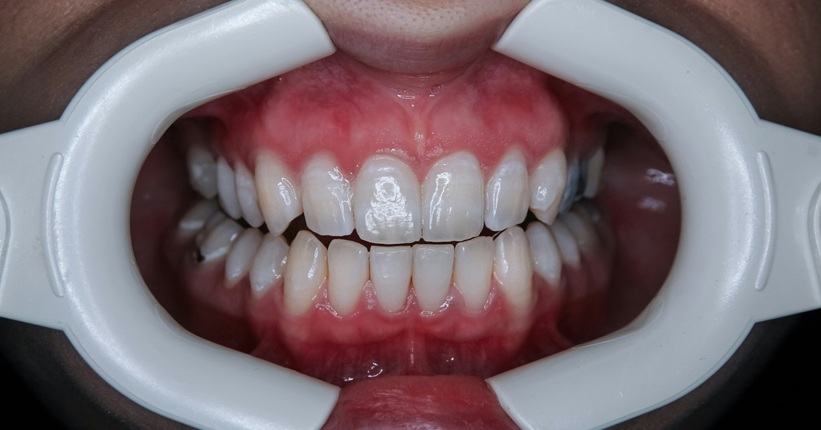
Gum pain — what can it mean and how to deal with it?
Pain and swelling of the gums are ailments that can affect anyone, regardless of age. Although they are often underestimated, they can be a sign of more serious oral health problems. Inflammation of the gums not only causes discomfort and pain, but can also lead to difficulty eating, speaking and daily functioning. Understanding the causes of these symptoms and knowing effective methods to relieve pain and prevent swelling is critical to maintaining gum health and overall oral health. In this article, we will look at the most common causes of pain and swelling of the gums, as well as offer practical tips and methods of treatment that will help in the fight against these troublesome problems.
What are the causes of gum pain?
A painful and swollen gum can mean several different health problems in the mouth. Here are some of the most common causes.
Gingivitis: This is the most common cause of swollen and painful gums. Gingivitis is inflammation of the gums caused by the accumulation of plaque that contains bacteria. If left untreated, it can lead to more serious periodontal disease.
Periodontitis: untreated gingivitis can lead to periodontitis, a more serious infection that can damage the tissues and bones that support the teeth.
Bacterial or viral infections: Infections in the mouth, such as oral herpes or canker sores, can cause pain and swelling of the gums.
Abscess: Periodontal abscess or periapical abscess are reservoirs of pus caused by a bacterial infection. This can cause intense pain and swelling of the gums.
Mechanical trauma: damage to the gums due to hard food, accidental biting of the cheek, or improper use of dental floss can lead to pain and swelling.
Allergic reaction: some people may have allergic reactions to toothpastes, mouthwashes, or other products used in oral hygiene.
Improper oral hygiene: neglecting daily brushing and flossing can lead to the accumulation of plaque and tartar, which causes gingivitis.
Hormonal changes: hormonal changes, especially in pregnant women, during menstruation or during menopause, can cause the gums to become more sensitive and swollen.
Vitamin deficiencies: Deficiencies in vitamin C (scurvy) and other essential nutrients can lead to gum problems.
Smoking: Cigarette smoking is one of the main risk factors for gum disease. Smoking weakens the immune system, making it difficult to fight gum infections.
If you experience swollen and painful gums, it is important to consult a dentist. Early diagnosis and treatment can prevent more serious health problems and improve your comfort of life.
What symptoms most often accompany swollen gums?
Swollen gums are often accompanied by a number of symptoms that may indicate inflammation or infection. Here are the most common of them.
Pain and sensitivity: Gums can be painful and sensitive to touch, eat, and drink, especially hot, cold, or spicy foods.
Bleeding: bleeding gums when brushing teeth, flossing, or eating hard foods.
Red and altered gum colors: the gums can be intense red, dark pink or even purple, which is a sign of inflammation.
Gum recession: the gums can recede, exposing more tooth surface or tooth roots.
Bad smell from the mouth (halitosis): infections and plaque buildup can lead to bad breath.
Excessive accumulation of plaque and tartar: a yellowish or brownish layer on the teeth may be visible, especially along the gum line.
Enlarged gums: The gums may appear larger, swollen, or puffy.
Abscess: an abscess or a small bubble filled with pus on the gums may appear, which is a sign of a bacterial infection.
Loose teeth: in more advanced cases of gum disease, teeth can become loose due to weakening of the supporting tissue and bone.
Changes in the bite: you can notice changes in the way the upper and lower teeth adhere to each other.
Itchy gums: some people may experience itching in the gums, which is the result of inflammation.
If you notice any of these symptoms, it is recommended that you visit the dentist as soon as possible for an accurate diagnosis and appropriate treatment. Early intervention can prevent more serious health problems and help maintain oral health.
When to consult swollen gums with a dentist?
Consultation with the dentist is advisable when you notice swollen gums, especially if it is accompanied by other symptoms. If the swelling of the gums persists for several days without visible improvement, it is worth going to a specialist. Also, severe gum pain that makes it difficult to eat, drink or function daily is a reason to visit the dentist. Regular bleeding of the gums when brushing teeth, flossing or eating, as well as the presence of an abscess or purulent discharge on the gums, which may indicate a serious infection, also require consultation.
If you notice that the gums begin to recede, exposing more of the tooth surface or the roots of the teeth, you should see a dentist. Changes in the color of the gums, such as an intense red, dark pink or purple hue, can be a sign of inflammation and require professional evaluation. In addition, a chronic bad smell from the mouth, which may indicate the accumulation of bacteria and inflammation, is also a reason to visit. In any case, if you have any doubts or worrying symptoms related to the gums, it is best to consult a doctor to get the right diagnosis and treatment.
Root canal treatment in Szczecin.
30 years of experience. Check us out.
Read more
Sore gum at the eight—what does it mean?
Gum pain in the area of the wisdom tooth, or eights, can be associated with several dental problems. The most common cause is a piercing wisdom tooth. When a wisdom tooth breaks through the gum, it can cause pain, swelling and inflammation. This is a natural process, but it can be very uncomfortable.
Another cause is the lack of space in the mouth. If there is not enough space in the mouth for a wisdom tooth, it can grow at the wrong angle, which causes pain and pressure on neighboring teeth and gums.
Pain and swelling can also cause inflammation of the gums around the partially ejected wisdom tooth. You also need to watch out for infections around the eights. Bacteria can easily accumulate around the wisdom tooth, especially if it is partially ejected, which can lead to infection and abscesses.
Due to the difficulty in cleaning the area of wisdom teeth, they may be more prone to caries, which can also cause gum pain.
If the gum pain at the eight persists for a long time, intensifies, is accompanied by severe swelling, fever or difficulty opening the mouth, a visit to the dentist is necessary. The dentist can carefully assess the situation, take an X-ray to see the position of the wisdom tooth, and recommend appropriate treatment, such as antibiotics, cleaning the gums, and in some cases removing the wisdom tooth.
How long does the gum hurt after pulling out a tooth?
Gum pain after tooth extraction is a normal phenomenon and usually lasts from several days to a week, depending on individual factors and the course of the procedure itself. Here is the general time frame. In the first two days after the procedure, pain and swelling are most intense. Bleeding may also occur at this time. The use of cold compresses and painkillers can help relieve symptoms. 3-7 days after the procedure, the pain should gradually subside. Puffiness also begins to decrease. Most patients experience significant improvement after about a week. Continuing gentle oral hygiene and avoiding irritating foods is key. 7-14 days after the procedure, in most cases, the pain and swelling should disappear completely. The gum will continue to heal, but the discomfort should be minimal. During this time, you can gradually return to normal eating and hygiene habits.
If the pain and swelling persist for more than two weeks, this may indicate complications such as infection or dry alveoli. In this case, a visit to the dentist is necessary. Each patient is different, so the healing time may vary depending on the general state of health, the degree of complexity of the procedure and the individual reactions of the body. If the pain is very severe, does not go away or is accompanied by other disturbing symptoms, such as fever, bad smell from the mouth or purulent discharge, you should immediately contact the dentist.
In summary, pain and swelling of the gums are complaints that can have various causes, from improper oral hygiene, to infections, to gum disease. It is important not to ignore these symptoms, as they can lead to more serious health problems. Regular visits to the dentist, proper oral hygiene, and a healthy lifestyle are key to maintaining gum health. If pain or swelling occurs, it is worthwhile to consult a specialist to identify the cause and implement appropriate treatment. By taking care of the health of your gums, you invest in your overall health and well-being, which translates into a better quality of life. Remember that prevention and early intervention are the best ways to avoid more serious dental problems.
Content author

Dr. Wojciech Gącienica-Ciułacz
Dr. Wojciech Gącienica-Ciułacz is a dentist for whom dentistry is a true vocation. In his practice, he stands out for his extraordinary ability to listen carefully to patients, thanks to which he is able to precisely adjust the treatment plan to the individual needs and expectations of each person. His approach is based on the deep conviction that effective dental therapy must take into account not only the medical aspect, but also the comfort and well-being of the patient.

Start treatment already today!
Make an appointment and discover why our patients recommend us to their loved ones. We will take the utmost care of your smile.


